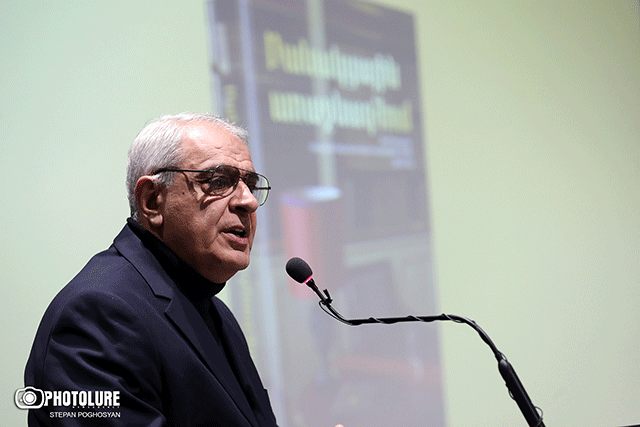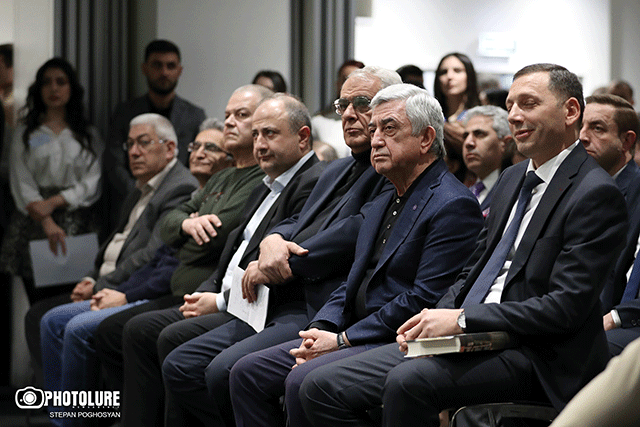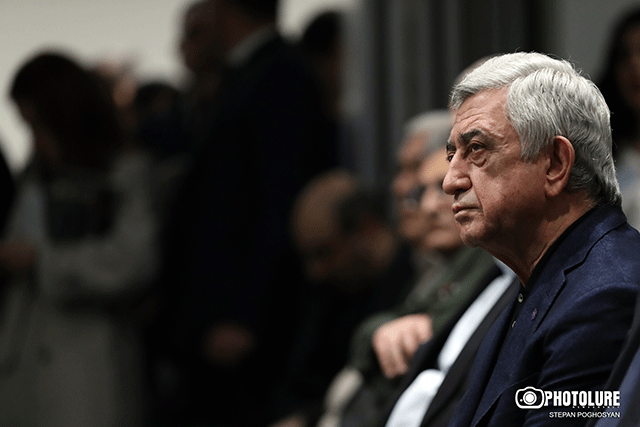March 7 was the presentation of the book “On the Frontline of Negotiations” by Serzh Sargsyan, the Third President of RA. It summarizes Serzh Sargsyan’s statements, messages, speeches, articles, and interviews during his ruling period’s ten (2008-2018) years and four (2018-2022) years of the post-presidential period regarding the negotiation process of the Nagorno-Karabakh conflict settlement.
David Shahnazaryan, former Ambassador-at-Large, urged to read the book, study it and get an idea about the entire negotiation process.
“I would like to mention some red lines and principles. The most important of the red lines is that any status of Artsakh within Azerbaijan was excluded during the entire negotiation process. This question is fundamental because when we say security, the highest level of it is status. This principle was maintained throughout the negotiation process. Another important principle that I would like to mention is that Armenia and Artsakh are in the same security system.
Unfortunately, we are witness to what their separation leads. Another vital principle by which Armenia was guided in those years is providing military-political balance. If we go back militarily, we have to compensate politically. It has been possible to do this with great success. One more thing is essential: it is very naive to say that Armenia negotiated with Azerbaijan. No, Armenia negotiated with the international community. During the entire negotiation process, the position of Armenia and the international community was on one side, and Azerbaijan was on the opposite side.
Read also
Referring to the Kazan negotiations, David Shahnazaryan said. “I’ll tell you what two high-ranking officials of Co-Chair countries told me after the meeting in Kazan. They noted that Aliyev had been deceiving us for two years and holding us by the nose. Hopes were high that progress would be made in Kazan. After Kazan, on June 24, 2011, the Presidents of the Co-Chair countries repeated the same as in the previous two statements two more times. Isn’t it better proof that Armenia was with the international community?
Three of the UN Security Council’s five permanent members admit it is the international community. There can be no other point of view.” Speaking about the four-day war of 2016, Shahnazaryan agreed with Edvard Nalbandyan that Aliyev was at a dead end and that was a desperate step, for which he had made a big bet. “The four-day war, which was condemned not only in a military sense but also in a political sense, and in my opinion, after that, the most significant peak of the negotiation process began. What happened in St. Petersburg and Vienna?
Three items were on the agenda: international investigation of incidents on the line of contact, installation of special devices, and increasing the team of Andrzej Kasprzyk, representative of the OSCE Chairman-in-Office. It meant the internationalization of the contact line. If the Nagorno-Karabakh conflict was internationalized in 1992, then that line of contact was very close to being essentially internationalized. And it is no coincidence that Aliyev officially complained that there was too much pressure on him to recognize Nagorno-Karabakh.
If you read the Madrid document carefully, by accepting it, Aliyev accepted that Artsakh is not part of Azerbaijan because the status must be determined by an expression of will with binding legal consequences.” This is the negotiation legacy they left in 2018.
Shahnazaryan summarized. “This was the agenda, essentially a trap for Azerbaijan with the Minsk Group. There was no other agenda.” Speaking about Lavrov’s plan, Shahnazaryan emphasized. “Five districts are liberated, Artsakh armed forces leave, and two Kelbajar and Lachin corridors districts remain until the status issue is decided. Let me open a few more parentheses:
Do you understand that this means forever, or must Aliyev agree to the referendum? Everyone knew there would be no referendum and that situation would be maintained. In this situation, the current government got the negotiation, which is the legacy. Let me say one more thing: the territories from which the armed forces of Artsakh were withdrawing of them should have been demilitarized; this is a significant moment. The fifth point of the elements of the Madrid document states: the right of return of refugees and displaced persons not return”.
In the end, David Shahnazaryan told an episode. “It was the 44-day war, if I’m not mistaken, on October 21-22, when once again, the current government of Armenia rejected the opportunity to stop the war. I was in Artsakh and often spoke on the phone with the third President. I asked him when he thought the leadership of Armenia would agree to stop the war.
He said, “I’m sure it won’t happen until Shushi surrenders.” Shahnazaryan mentioned that Armenia always negotiated with dignity, our enemies hated us but also respected us, and now we are in this disaster. “We are constantly being humiliated. Under the blockade of Artsakh, massive aid is being sent to Turkey demonstratively.
Many people will remember that about 2-3 months ago, one of Turkey’s high-ranking officials announced that Turkish drones destroyed 75% of Azerbaijan’s targets during the 44 days of 2020. I want to add something that many people do not know: during the 44-day war, Azerbaijan did not have any Turkish drones. All of them were Turkish and administered by Turkish officers. I am responsible for this statement of mine. Now, this humiliation is more severe than the loss of the war. You can lose, but you have to keep your dignity.”
David Shahnazaryan also announced the following. “No matter how much they try to convince the authorities of Artsakh to declare that they agree to be part of Azerbaijan, I do not rule out that the current authorities of Artsakh will make such a statement, but that does not mean closing the issue of Artsakh, the people of Artsakh will decide everything. It will not mean that the issue of Nagorno Karabakh is closed. And that way of thinking that the Nagorno-Karabakh issue will be closed like that, they are mistaken both in Baku and Ankara, and in the building across the street (he means the RA government building), and also in Moscow… The Artsakh issue will not be closed. Without the issue of Artsakh, it is impossible to establish stability in this region”.
Hripsime JEBEJYAN





























































